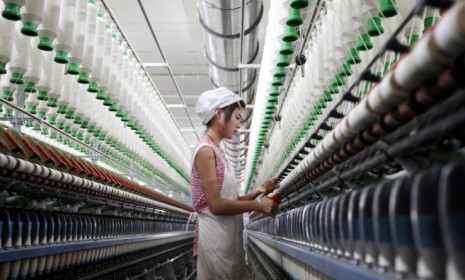Is China's 'inevitable' slowdown good for the global economy?
The world's second-largest economy is cooling off after years of torrid growth — and Chinese consumers and U.S. manufacturers alike may be cheering the news

A free daily email with the biggest news stories of the day – and the best features from TheWeek.com
You are now subscribed
Your newsletter sign-up was successful
The Chinese government's recent projection of a slowdown of economic growth this year caused hand-wringing in markets from Shanghai to New York. (China still projects GDP growth of 7.5 percent this year — an enviable rate by almost any standard.) Since the 2008 financial crisis, China has been the primary engine of the global economy, and anything but its usual white-hot growth could imperil the nascent recoveries in U.S. and Europe. While most agree that China's eventual slowdown is "inevitable," economic tea-leaf readers are debating the effect it will have on China and the world at large. Is there an upside to slower growth in China?
This is terrific news for the global economy: News of China's slowdown has "sent tremors through Wall Street," but the truth is, it "couldn't come at a better time for Western economies," says John Maxfield at The Motley Fool. For years, China's economy has relied heavily on cheap exports. By preparing for a slight downturn, it is signaling a shift away from that model. In the future, China intends to encourage "greater domestic consumption" by the Chinese people, which means that a "billion new consumers" are about to come online for Western companies and goods. Don't be fooled by those predicting an "ominous turn" in the global economy: Its "best days are still ahead."
"The upside to a downshifting China"
The Week
Escape your echo chamber. Get the facts behind the news, plus analysis from multiple perspectives.

Sign up for The Week's Free Newsletters
From our morning news briefing to a weekly Good News Newsletter, get the best of The Week delivered directly to your inbox.
From our morning news briefing to a weekly Good News Newsletter, get the best of The Week delivered directly to your inbox.
But China is staring disaster in the face: China's projected growth of 7.5 percent is "barely fast enough to create jobs, income, investment, and opportunity in such a vast developing nation," says Investor's Business Daily in an editorial. China also faces daunting demographic challenges — thanks to the one-child policy, which all but guarantees a low birth rate that will shrink China's population, the country's "impressive growth spurt is ending just as its population is peaking and getting older." China must quickly privatize its state-owned enterprises to avert disaster, since they "are only about a third as productive as private ones." Failure to do so is a "recipe for social unrest and economic crisis."
"China enters era of slow economic, population growth"
Time will tell: The great debate about China's economy revolves around two options: "A soft or hard landing," says Satyajit Das at MarketWatch. During the financial crisis, China injected billions of dollars into its economy to keep it afloat, a form of "Botox economics." In a soft-landing scenario, Chinese consumers buying more stuff will smoothly replace the state's largess as the "key driver" of the economy. If it's a hard landing, China could experience a collapse of the numerous bubbles it has created. Either way, China's days of using Botox injections are numbered. As a reputed Chinese proverb goes, "There is no feast that does not come to an end."
"Chinese banquet is nearing the end"
A free daily email with the biggest news stories of the day – and the best features from TheWeek.com
-
 Buddhist monks’ US walk for peace
Buddhist monks’ US walk for peaceUnder the Radar Crowds have turned out on the roads from California to Washington and ‘millions are finding hope in their journey’
-
 American universities are losing ground to their foreign counterparts
American universities are losing ground to their foreign counterpartsThe Explainer While Harvard is still near the top, other colleges have slipped
-
 How to navigate dating apps to find ‘the one’
How to navigate dating apps to find ‘the one’The Week Recommends Put an end to endless swiping and make real romantic connections